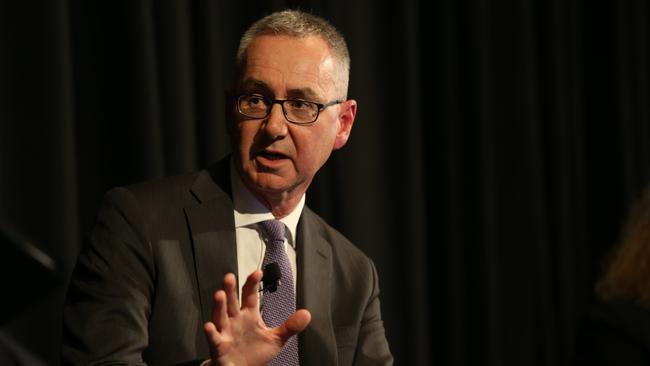APRA warns about climate risks on bank lending books
The prudential regulator is flagging a ‘clear impact’ from climate-related risks on bank lending books, as it nears the release of a review that assessed negative effects on loan portfolios.

The prudential regulator is flagging a “clear impact” from climate-related risks on bank lending books, as it prepares to release the results of a sweeping review that assessed negative effects on loan portfolios.
The Australian Prudential Regulation Authority’s new chairman John Lonsdale on Friday told the corporate regulator’s annual conference climate change posed a “big risk” to the financial sector, even though the financial system was strong and well capitalised.
Banks have participated in APRA’s climate vulnerability assessment which gauged the potential impact of transition risks on their mortgage and business lending portfolios.
“We will be coming out very soon with some results out of that,” Mr Lonsdale said.
“Without wanting to front-run that too much, what I’d say is there is a clear impact on the financial metrics through climate change.
“Not in aggregate but certainly pockets, so there are regional impacts, there are different impacts on different types of businesses.”
On the sidelines of the conference, Mr Lonsdale told The Australian that APRA was aiming to release the results of the assessments by the end of the month.
APRA executive director Sean Carmody said the dominant climate risks for banks were within their loan books.
“A lot of the analysis is modelling credit exposure, really looking at what it does to elevate credit losses in certain segments,” he added.
Mr Lonsdale – who was appointed to APRA’s top post on October 31 – also delved into issues of data security and cyber risks at the conference, urging boards and company management to boost their efforts in those areas.
“There is work to do … boards really need to push into cyber (protection) more, challenge management,” he said, noting that management needed to ensure boards were presented with adequate material and data reporting and assessed risks related to outsourcing to third parties.
“Know what data you’ve got, know if it’s sensitive, know if it’s critical and most of all know where it is,” Mr Lonsdale added.
His comments come after high-profile data breaches at Optus, Medibank Private and a unit of BWX.
Australian Securities & Investments Commission chairman Joe Longo said he expected companies would continue to grapple with cyber risks.
“Our dependence on data and technology … this is near-term readily foreseeable present risk that I think we need to be really focused on,” he added.
“It’s really up to each entity and business to get a grip on this subject.”
Melinda Conrad – a non-executive director at companies including Stockland, ASX and Ampol – said companies were navigating a difficult and volatile period, including challenges around cyber risks.
“How that plays out geopolitically from a defence, from a cyber point of view is incredibly complex from a board’s perspective … it is really thinking deeply about the resilience of your business,” she told the conference.
The Australian Competition & Consumer Commission’s deputy chair Delia Rickard expressed concerns about the prevalence of scams in Australia, with those targeting investors leading to losses of more than $1bn this year.
“Scams are out of control,” she said. “I really hope that it (newly announced National Anti-Scam Centre) delivers an economy-wide response to scams so it does make Australia the hardest target out there.”
Ms Rickard said the ACCC was working with other agencies to tackle the issue and reduce losses linked to telecommunications scams.
“We’ve now more than halved the number of scam phone calls. They are being blocked very regularly. That’s happening. With SMS unfortunately they’re moving to encrypted apps,” she added.
“Working with the police and to the extent we have local scammers we are seeing arrests as a result of some of that … If we are ever going to win on this – winning is possible – then we all have to co-operate and play together; otherwise we are just not going to succeed.”
One conference session debated the topic of introducing new legal provisions for unfair practices and whether that would provide additional consumer protection and redress.
Ms Rickard was in support of the move.
“We really need an unfair practices law,” she said.
Treasury is planning to release a consultation paper on the issue in 2023 as it determines whether there is a gap in the current regulations.
Consumer Action Law Centre chief Gerard Brody said new provisions, including an unfair trading prohibition, could help in plugging gaps in the law.
“I’ve repeatedly seen tricky business models that find and exploit gaps in the law,” he said. Too often regulation happened “long after the harm and exploitation” had occurred, he added.
But Clayton Utz partner Steven Klimt said any move to introduce new provisions needed to be considered in light of the whole regulatory framework, to avoid the risk of “very lazy” new regulation. He noted that financial services companies were already obliged to provide efficient, honest and fair services.






